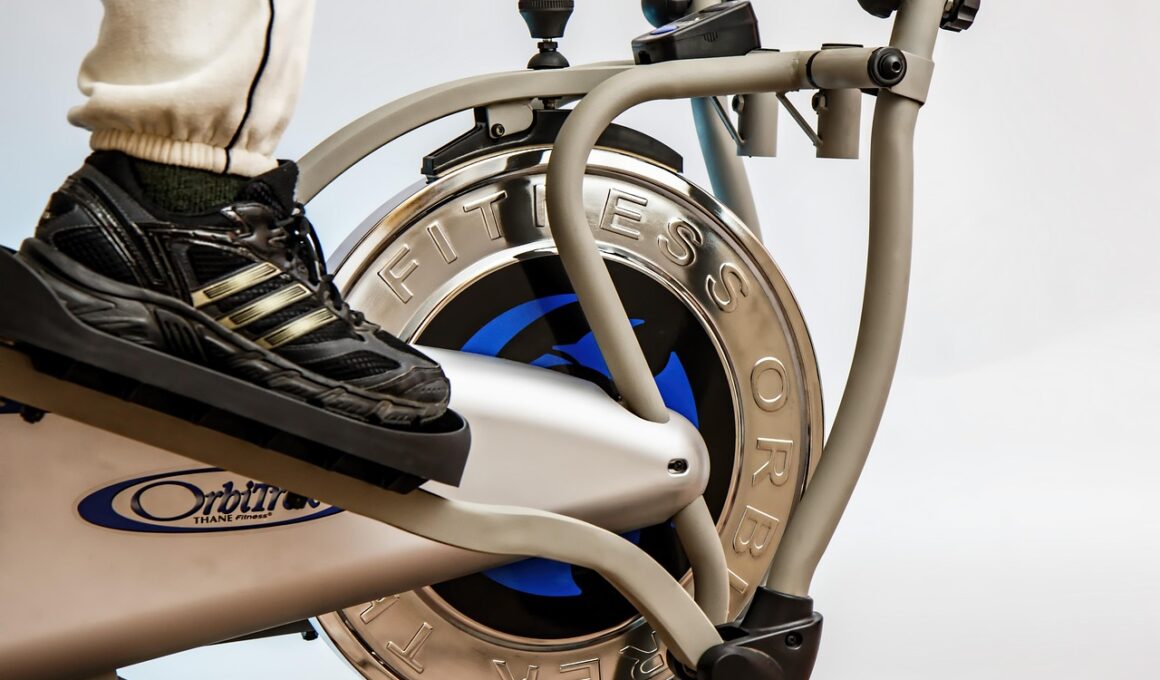Effective Cardiovascular Training Plans for Healthy Cholesterol
Maintaining healthy cholesterol levels is vital for cardiovascular health. Regular cardiovascular workouts can effectively help in managing cholesterol levels by reducing LDL and increasing HDL cholesterol. Aerobic exercises, such as running, swimming, cycling, or brisk walking, significantly influence overall cardiovascular fitness. It is recommended to engage in at least 150 minutes of moderate-intensity aerobic exercise each week, which can be broken down into smaller sessions. This approach can make it easier to fit exercise into your daily routine. Besides structured workouts, incorporating physical activity into everyday life, such as taking the stairs or walking during lunch, can additionally promote cardiovascular wellness. Monitoring cholesterol levels regularly is also essential, as it provides insight into how your body responds to your fitness regime. With the right practices, individuals can significantly lower their cholesterol levels, enhancing heart health. To reach optimal fitness and cholesterol management, consider working with a fitness professional who can tailor workouts to your specific needs and goals, ensuring your workouts are both enjoyable and effective in reducing cholesterol levels, while also improving cardiovascular health.
Combining dietary changes with cardiovascular workouts can maximize the benefits for cholesterol management. Adopting a heart-healthy diet rich in fruits, vegetables, whole grains, and lean proteins can help lower cholesterol levels. Foods such as oats, fatty fish like salmon, and nuts are particularly beneficial. Reducing saturated and trans fats is equally crucial, as these can lead to higher cholesterol levels. Planning your meals while incorporating these healthy foods can complement your fitness routine. For those starting a new exercise program, consider beginning with low-impact aerobic activities. Swimming or cycling can be great options to ease into fitness without additional joint stress. Gradually increasing intensity allows your body to adapt effectively. Maintaining consistency in both exercise and diet plays a fundamental role in achieving desired results. Setting realistic and achievable goals will help in staying motivated and tracking progress. Utilizing apps or engaging social support can enhance accountability, making your journey toward better cholesterol health more enjoyable. Remember to celebrate small victories, and do not hesitate to seek guidance from a nutritionist or fitness trainer for tailored recommendations.
Types of Cardiovascular Workouts
When it comes to managing cholesterol, various cardiovascular workout routines can be effective. High-Intensity Interval Training (HIIT) is known for its efficiency and effectiveness in burning fat while also improving cardiovascular fitness. Incorporating HIIT sessions into your weekly plan, with intervals of intense effort followed by periods of rest, can yield rapid results in managing cholesterol levels. Another excellent approach is a steady-state cardio, which includes activities like jogging or cycling at a consistent pace. These longer bouts of moderate exercise help enhance endurance and foster heart health. Moreover, engaging in group fitness classes can provide motivation as well as camaraderie. Classes like Zumba or spinning not only make workouts enjoyable but also ensure a commitment to regularity. Consider adding cross-training to your routine; this can prevent monotony and reduce injury risk. Mixing up workouts can also target different muscle groups, leading to an overall better fitness level. Always listen to your body and adjust your routines accordingly to maintain sustainable, lifelong healthy exercise habits.
In addition to structured workouts, incorporating active leisure activities can provide a fun and engaging way to stay fit. Activities such as hiking, dancing, or playing sports can elevate your heart rate while providing mental stimulation and social interaction. Most importantly, ensuring the workouts you pursue are enjoyable can help you stick to your fitness goals long-term. Breaking workouts into shorter segments per day can also enhance consistency, making it less daunting. For example, engaging in three 10-minute walks throughout the day can be equally beneficial as a single 30-minute routine. Moreover, assessing progress through regular fitness assessments and cholesterol checks can help assess the effectiveness of the workout plans and dietary changes you implement. Keeping a journal to track your workouts and diet can provide motivation as you observe your progress. Re-evaluating your plan regularly ensures you keep challenges appropriate to your fitness level. Consider adjusting the balance of aerobic workouts and strength training, as building muscle also aids metabolic health and cholesterol management.
Importance of Consistency
Consistency is crucial when working toward lowering cholesterol levels and achieving cardiovascular fitness. Establishing a regular workout schedule can lead to improved adherence over time. Aiming to work out at the same time each day can create a routine that makes it easier to stay on track. Find a workout buddy to add accountability and make the journey more enjoyable. Social interaction enhances motivation and introduces a level of commitment that can be difficult to achieve alone. Remember that individual responses to workouts vary; therefore, adjusting your strategies based on personal experience is important. Patience is key, as cholesterol management does not occur overnight. Other factors, such as genetics and initial cholesterol levels, play roles in your results. Even if some days feel more challenging than others, maintaining an optimistic attitude will help sustain motivation. Celebrate every step on the path to better health, whether that be an increase in energy levels or decreases in cholesterol readings. Consistently prioritizing both physical activity and healthy eating habits can yield significant long-term benefits in managing cholesterol and promoting overall cardiovascular fitness.
The health benefits of regular cardiovascular workouts extend beyond cholesterol management and may improve overall quality of life. Engaging in cardiovascular exercise has been linked to better mood, reduced anxiety, and improved sleep patterns. These lifestyle improvements arise from the release of endorphins, often dubbed feel-good hormones, during physical activity. Such benefits can foster a more active lifestyle, leading to further health advantages. Additionally, managing stress through exercise plays a powerful role in cardiovascular health, as high-stress levels can elevate cholesterol and blood pressure. Carrying out workouts in natural environments, such as parks or trails, can offer added mental health benefits. Understanding the importance of holistic approaches to health can further encourage you to adopt cardiovascular fitness strategies. Lastly, involving family members in physical activities can enhance engagement, making it a fun experience. From leisurely family walks to friendly sports competitions, finding ways to incorporate movement into your shared life can lead to improved health for everyone involved. Finding joy in workouts is essential; approaches to ensure fitness becomes a preferred and exciting part of your daily routine.
Final Thoughts on Cardiovascular Fitness
In conclusion, managing cholesterol and improving cardiovascular fitness requires a comprehensive approach that includes regular exercise, proper nutrition, and lifestyle modifications. By engaging in various aerobic activities, setting realistic goals, and being consistent, anyone can effectively manage cholesterol levels for better heart health. Regular assessments will highlight progress, while social support encourages ongoing commitment. Adapt your routines to fit your preferences to ensure sustainability over time, thus transforming fitness from a temporary challenge into a lifelong habit. Whether through community classes, at-home workouts, or active family time, there are numerous ways to stay active while enjoying the process. Ultimately, the journey to better cardiovascular fitness and healthy cholesterol levels is uniquely individual, and it’s crucial to celebrate personal achievements along the way. Focus on how far you have come rather than solely on the destination. With dedication and perseverance, you will foster a routine that promotes long-lasting health benefits for years to come, significantly lowering cholesterol levels and enhancing heart health, ensuring you lead a vibrant and healthy life.
This paragraph or additional content can touch on more specific factors aiding cardiovascular training, such as incorporating flexibility and strength training. While the focus is primarily on cardio for cholesterol management, understanding how these facets fit in the bigger picture can further bolster overall health. Engaging in diverse workout modalities is vital for comprehensive fitness, emphasizing the role of each component in a balanced routine. Implementing changes gradually makes adapting to new programs easier without overwhelming oneself. Each individual’s fitness journey represents a personal adventure, requiring ongoing assessments to determine what consistently works best. Taking the time to rest and recover is equally important, fostering a sustainable approach to managing cholesterol and enhancing overall fitness. Proper recovery aids muscle repair and resilience, emphasizing the significance of attentive self-care. Establishing habits that favor your overall well-being will be essential for maintaining momentum in your cholesterol management plan. Embracing healthier choices while pursuing enjoyable activities will yield not only short-term advantages but also long-term wellness results. Staying informed and receptive to changes will empower adjustments contributing to your overall heart health journey.





